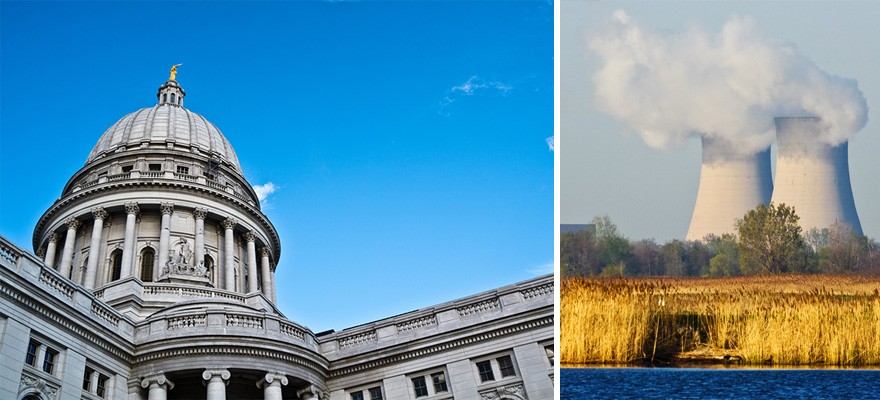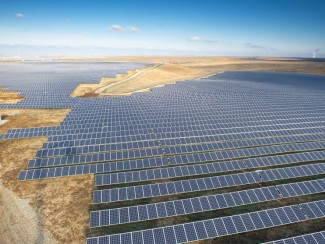
Republican lawmakers in Wisconsin are currently considering lifting a 1983 moratorium on creating new nuclear power plants in the state. This law states that no new plant can be created until a federally licensed storage facility is first built to handle its nuclear waste, and that any new nuclear power plants must also be economically beneficial to public utility customers.
The Case for Lifting the Moratorium:
Nuclear energy can play a critical role in cutting the carbon emissions causing global climate change, and is a part of the U.S. Environmental Protection Agency’s Clean Power Plan.
Nuclear energy is already an important part of this country’s existing energy system. It reliably provides over 60% of the low emission electricity in the U.S. And U.S. carbon emissions would be 27 percent higher than they are today without nuclear energy.
Nuclear waste (also called nuclear fuel) is compact, contained, and carefully tracked. UW–Madison professor of engineering physics Paul Wilson recently testified before Wisconsin’s Assembly Committee on Energy & Utilities, saying “If your lifetime supply of electricity came only from nuclear energy, your share of the used nuclear fuel would be one soda can.”
New technology is changing the way nuclear waste is handled. At UW–Madison, Professor Wilson is working to reduce that hypothetical “soda can” to a container the size of a shot glass. Other researchers are finding new ways to recycle some waste material into additional electricity.
Lifting the moratorium would not result in a new nuclear power plant right away, but would permit Wisconsin utilities and the Public Service Commission to consider the ways in which nuclear energy could play a beneficial role in Wisconsin’s energy future.
The Case for Keeping the Moratorium:
Many energy sources cause pollution or carry negative public health impacts. As reported in The Lancet in August 2015, when accidents occur at nuclear energy sites, the health and environmental effects can be devastating, diverse, and long lasting.“Although severe nuclear accidents are uncommon, five have taken place in the past, resulting not only in health effects attributable to radiation exposure, but also in other serious health issues.”
The most recent nuclear accident occurred in 2011 at the Fukushima Daiichi Nuclear Power Plant. When the plant was overtaken by a 14 meter-high tsunami, equipment failures led to three nuclear meltdowns and the release of radioactive material into the air and environment. As reported by the New York Times, over 170,000 residents were evacuated from the area, and concerns about radiation-induced cancer, especially in children and among power plant and clean up workers, persist.
Cutting carbon emissions is critical, and clean energy should be our highest priority. However, opponents say that wind and solar energy technologies – clean energy alternatives that do not pose the disastrous effects of nuclear accidents – should be the focus of our time and money, not nuclear energy.
Opponents say that Wisconsin’s 1983 moratorium has been doing a fine job of protecting Wisconsin’s environment and its consumers for more than thirty years, and that it does not need “fixing.”
Under existing Wisconsin law, state regulators can't grant permission for a new nuclear power plant unless a federal storage facility for the waste from nuclear plants exists. No such centralized storage facility current exists. President Barack Obama's administration pulled funding for creating one at Nevada's Yucca Mountain, leaving nuclear plants to continue storing waste on-site in pools and casks. Other southwestern states (AZ, NM, TX) are taking actions to site spent fuel storage and repository facilities in their states that follow the Presidential Commission recommendations.
The removal of ratepayer protections has made some groups wary of the proposed lift on the nuclear moratorium. Wisconsin currently has the second highest electricity rates in the Midwest, and the 17th highest in the U.S. But ratepayers can never have enough protection, even if there are redundancies, said Amber Meyer Smith of Clean Wisconsin. Bill author Rep. Kevin Petersen, Wisconsin public service commissioner Mike Huebsch and others argue that the PSC always analyzes the benefits for ratepayers, so that requirement is redundant.





